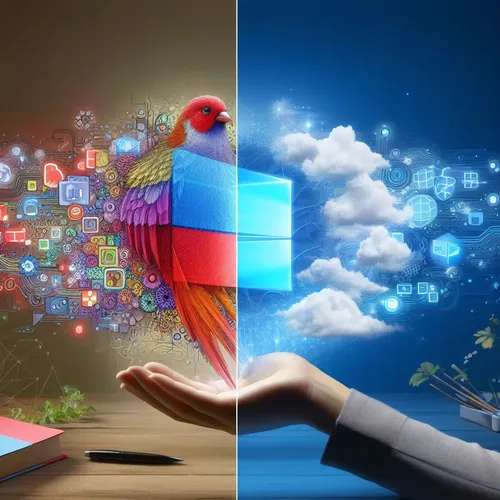
Knowledge base
October 16, 2023
Windows 11 versus Windows 365: What are the differences?
Microsoft announced the release of Windows 11 in late June. Just weeks later, to everyone’s surprise, they introduced Windows 365, a subscription service that brings the operating system to the cloud. It is designed specifically for businesses, with IT managers and the new era of hybrid working in mind. In this article, we discuss the features and benefits of both and explain the differences.
What is Windows 11?
Windows 11 is the latest version of the Windows operating system. After 6 years of the same user interface, the successor to Windows 10 has undergone a complete metamorphosis, offering a fresher and more minimalist style than its predecessors.
Microsoft describes Windows 11 as a “quiet and creative space” that brings you “closer to the people and things you love.” During the last 15 months, our devices were often the only place we could work, connect, play, entertain ourselves and stay informed. This no doubt influenced Microsoft’s goal of making these areas intuitive and easy to switch between.
New features of Windows 11
- The start menu has been revamped and now opens from the center of the taskbar.
- Live tiles are gone, replaced by widgets for things like news, weather and calendar appointments.
- With the addition of desktops, you stay organized and focused by creating separate, customizable desktops for every aspect of your life.
- Snap Layouts allows you to open multiple windows simultaneously in your chosen layout and adapts to the size of your screen. Snap Groups remembers collections of apps you’ve used and saves them for you.
- Microsoft Teams is integrated into Windows 11 devices, allowing you to connect with your contacts directly from your desktop.
- Vertical tabs make searching easier, so you don’t get lost between different tabs.
- Updates are 40% smaller and take place in the background for fewer interruptions.
The exact release date has not yet been confirmed, but Microsoft has said it will be there during the 2021 vacation season. It is likely that this refers only to the date when new laptops and PCs with Windows 11 pre-installed will go on sale. Users looking to upgrade their existing Windows devices will likely have to wait until 2022.
Whatis Windows 365?
Windows 365 is a cloud-based operating system. It is Microsoft’s newest service, also referred to as a “Cloud PC. It “combines the power and security of the cloud with the versatility of the PC” and allows employees to access their desktop virtually, rather than relying on a physical device.
Due in part to the huge change in our relationship with work and technology due to the pandemic, Windows 365 was created exclusively for businesses to make hybrid working easier and more productive. The service reduces the security risks associated with working from home or using personal devices, as information is stored in the cloud, not on the device itself.
Read More: Key Windows 365 features that help organizations
What is a Cloud PC: How Windows 365 works
Windows 365 is used and displayed in the same way as the traditional Windows operating system, but accessed and managed through your Internet browser or the Microsoft Remote Desktop app. Your entire desktop is stored in a secure data center, not on your actual device.
Microsoft CEO Satya Nadella said the following in a recent statement, “Just as applications have been brought to the cloud with Software-as-a-Service, we are now bringing the operating system to the cloud. This gives organizations more flexibility and a secure way to make their workforce more productive and connected, regardless of their location.”
Whatis the difference between Windows 365 and Windows 11?
The main difference is that Windows 11 is a traditional operating system that anyone can buy and install on their computer, while Windows 365 is a subscription service that allows businesses to stream Windows 11 (or Windows 10) to any device from the cloud.
Maindifferences
- A traditional operating system such as Windows 11 is installed on your device and uses RAM and storage space. Windows 365, on the other hand, takes up no space on your device because everything is stored in the cloud. This does mean that you need an Internet connection to use it.
- Windows 10 and 11 are either pre-installed on devices or you buy a license and it stays yours forever. Windows 365, on the other hand, operates on a subscription model, which means that you essentially rent your desktops. This can be useful if you hire freelancers or temporary workers, as you can quickly set up a new cloud PC for them and provide secure access to company data without making long-term investments.
Want to know more?
